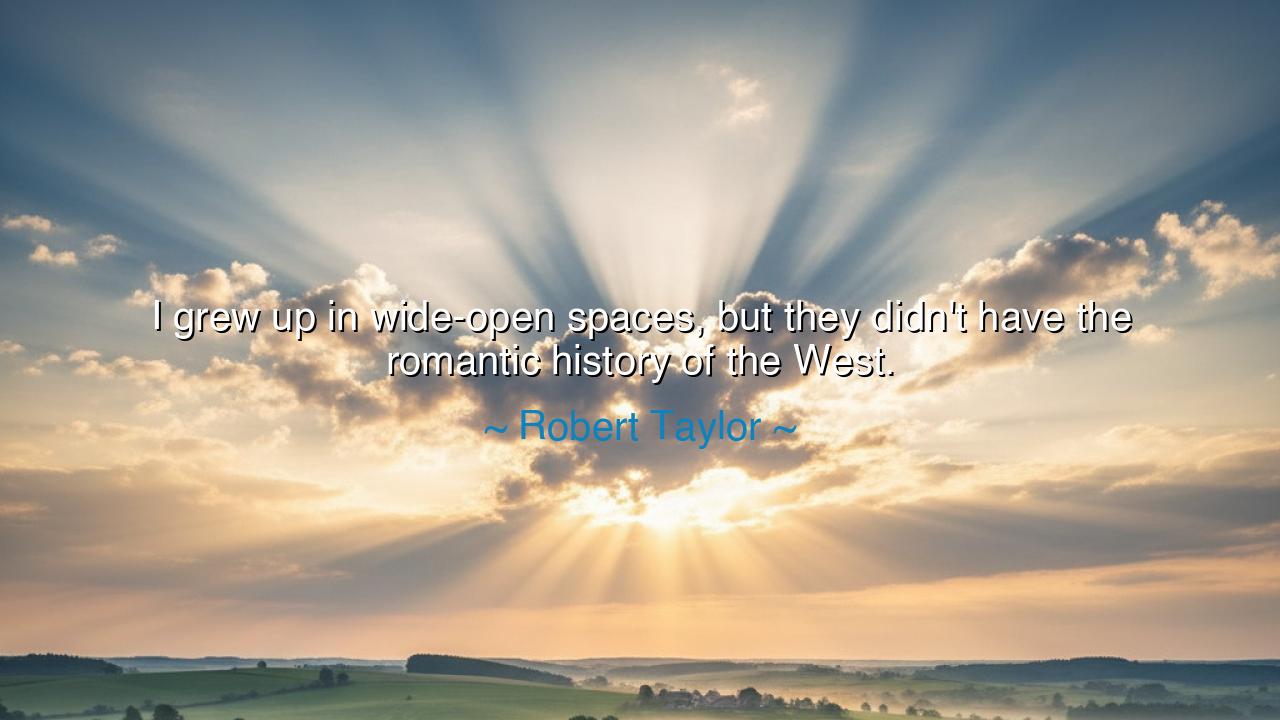
I grew up in wide-open spaces, but they didn't have the romantic






"I grew up in wide-open spaces, but they didn't have the romantic history of the West," Robert Taylor reflects, and in this statement, we glimpse a profound meditation on place, history, and identity. The wide-open spaces he refers to may evoke images of freedom, possibility, and nature's vastness—qualities that have shaped much of the human longing for adventure and exploration. Yet, Taylor's words also acknowledge a critical gap: while these spaces offered physical freedom, they lacked the romantic history that so often infuses a landscape with meaning, purpose, and cultural identity. The West, as understood in the mythic and historical sense, has long been viewed as a land of opportunity and conflict, filled with stories of settlers, pioneers, and heroes whose struggles and triumphs became the very foundation of a national identity. Taylor's reflection, then, highlights a longing for the mythic and the storied past, a desire to connect one's own life to the grand narratives that have come before.
In the ancient world, the concept of romantic history was of great importance. The Greeks and Romans celebrated their landscapes and cities not just for their beauty, but for the stories they carried—tales of gods, warriors, and philosophers who had shaped the course of human history. Athens was not simply a city; it was the birthplace of democracy and philosophy. Rome, with its grand architecture and forums, carried the legacy of emperors and legions that stretched across continents. These places were not just geographical locations; they were imbued with meaning and memory, connecting the present to the past in a continuous, living narrative. This romantic history is what gave these places their gravitas and purpose.
Similarly, in the American West, as Taylor alludes to, the romantic history that took root in the collective imagination is steeped in stories of pioneers, cowboys, and Native Americans—each group fighting for land, survival, and freedom in a vast and untamed land. The West became synonymous with the idea of a frontier where anything was possible. It was a land of transformation, where ordinary people became legends. The myth of the Wild West—with its dramatic gunfights, daring escapes, and profound challenges—has resonated across generations. As a result, the very landscape of the West was not just a physical space but a place charged with meaning, a site of struggle and redemption.
Taylor's statement, however, contrasts this idealized romantic history with his own experience of wide-open spaces that lacked such stories. The spaces he refers to might have been just as expansive, just as vast and full of possibility, but they lacked the deep, storied narratives that defined the West. These wide-open spaces, while physically expansive, were devoid of the romanticization that gives meaning to history. Much like the lands of ancient Egypt or Mesopotamia, whose deserts and plains are imbued with the weight of their civilizations’ legacies, Taylor’s spaces were not marked by the events or people that shaped a collective memory. Instead, they were simply wide expanses, a blank canvas with no narrative threads to bind them together.
This observation about the absence of romantic history in certain places speaks to a greater human need for connection—a need to feel that our lives, no matter how small, are part of a greater story. The absence of history in a place does not diminish its beauty or value, but it does raise the question of identity. We, as humans, seek to understand our place in the world not just through the present moment, but by connecting to the past. The stories of those who came before us give us a sense of continuity, reminding us that our struggles and triumphs are part of a larger narrative that shapes the world. As Herodotus once said, “History is the teacher of life,” for it is through the stories of the past that we learn how to navigate the future.
Thus, the lesson from Taylor’s words is not merely about the absence of romanticized history, but about the importance of creating meaning in the spaces we inhabit. While we cannot always control the stories that are told about the places we live, we can participate in shaping those stories. Just as the ancient Greeks wrote epic poems to immortalize their heroes, so too must we recognize that every moment, every decision, holds the potential to become part of a greater narrative. It is our actions, our passions, and our values that imbue the world with meaning, whether the spaces we inhabit are vast and wild or humble and familiar.
In our own lives, let us embrace the blank canvas of our own spaces, our own histories, and our own futures. Like the pioneers of the American West, we must create our own stories—ones filled with courage, vision, and purpose. Whether in the small corners of our daily lives or in the larger moments of our struggles, we have the ability to contribute to the romantic history of the world. Let us be the storytellers who, though born into wide-open spaces, bring them to life with the power of our own narratives and legacy.






AAdministratorAdministrator
Welcome, honored guests. Please leave a comment, we will respond soon